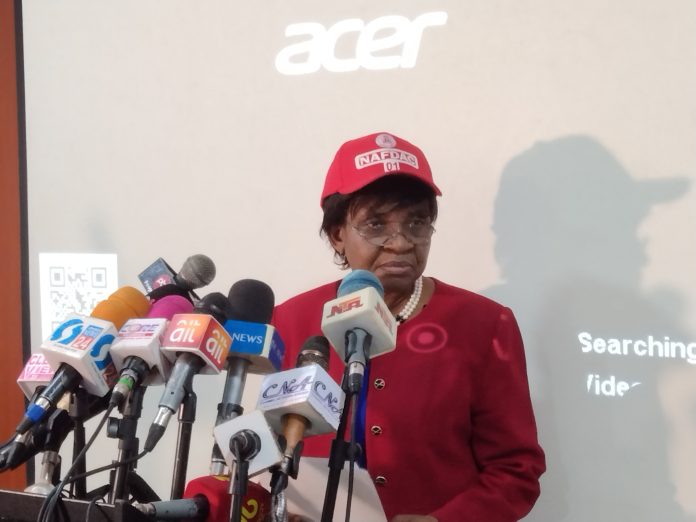N95 Billion (Ninety-five billion Naira) worth of unlicensed pharmaceutical products were destroyed in Cotonou by the National Agency for Food and Drug Administration and Control (NAFDAC).
This was announced at a meeting by Prof. Mojisola Christianah Adeyeye, Director General of NAFDAC at a press conference on Monday in Abuja, Nigeria, saying, combined international destruction of five 40-foot containers of unlicensed pharmaceuticals, including tramadol 200 MG and higher potency.
A group of NAFDAC officers, including those from the Investigation and Enforcement Directorate, traveled to Cotonou on December 21 and 22, 2022, for the purpose of destroying the five containers. They were led by Prof. Adebayo, Director of Ports Inspection Directorate.
Going down memory lane, she said, “Following an intelligence report from the Presidency in August 2018 , I directed the Director of Ports Inspection Directorate, Prof. Samson B. Adebayo on the intention of some unscrupulous importers to ship thirty-one (31) containers of unregistered pharmaceutical products including tramadol 200mg and above from India. The containers were labelled building materials and for bonded terminal.
“The Director, Ports Inspection Directorate, working with his Intelligence & Monitoring Unit commenced the surveillance and monitoring of the reported containers from the ports of loading to the successive ports where they were transloaded along the sea routes. The first approach was to collaborate with the Nigeria Customs Service under the leadership of Comptroller General (Col.) Ahmed Ali (rtd.).
“Eventually, twenty-one of the containers were discharged at the Apapa port in Lagos, Nigeria as manifested. One container couldn’t be tracked because of a missing container number. Out of the 21 containers, only two had building materials.
“However, as the importers of the containers became aware that NAFDAC was tracking and monitoring the containers on arrival at the Apapa port and intercepting them, they decided to change their strategy by diverting the remaining away from the Nigerian port.
“Four containers never got to Nigeria but were discharged at transhipment in Malaysia.
One container was transferred to the Cotonou port in the Republic of Benin while the remaining four were initially diverted to the Tema Port in Ghana but later diverted them to Cotonou having met resistance from Ghana Food and Drug Agency that NAFDAC already contacted for collaboration to stop the four (4) containers.
“Director-General of NAFDAC Prof Mojisola Adeyeye then liaised with the Ambassador of Nigeria to the Republic of Benin at the time, His Excellency Kayode Oguntuase, who worked tirelessly to ensure that the port authority in the Republic of Benin effected the seizure of the five containers on the request of NAFDAC. His successor His Excellency Olukayode O. Aluko never relented in his effort at ensuring that all these five (5) containers are released to NAFDAC for destruction.
“Meanwhile the other twenty-four containers Some entity took the case to court in Benin that the containers should be brought back to Nigeria. This took about one year plus but Ambassador Aluko stayed on the case until the court made the judgement that the containers can be destroyed in Benin. Alas, the government of the Republic of Benin eventually agreed to engage with the Nigerian counterparts to carry out the destruction of these containers in Cotonou. The following products were found in the five containers during the joint physical examination.
Brand name generic name details:Tamral 225 tablets tramadol hcl 1,276 CTNSX50 ROLLSX10X10 TABS; Tamral 250mg Tablets tramadol HCL 571 CTNS X50 ROLLSX10X10 TABS; Tramadol 120mg Capsules tramadol Hcl 129 CTNS X30ROLLSX20X10 CAPS; Tramadol 225mg Tabs tramadol Hcl 415 CTNSX50 ROLLSX10X10 TABS; really extra diclofenac tablets 50 mg diclofenac & caffeine 58 CTN X 50 X 10 X 10 tabs; and relity extra diclofenac tablets 50 MG diclofenac 24 CTN X 50 X 10 X 10 tabs
“The street value of the drugs was estimated at N95 Billion (Ninety-five billion Naira).
A team of NAFDAC officers (including Investigation & Enforcement Directorate officers), led by Prof Adebayo, the Director of Ports Inspection Directorate travelled to Cotonou where the destruction exercise of the five containers took place on 21st and 22nd December 2022.
She continued: “This international landmark achievement (that had never been recorded in the history of the two countries and NAFDAC) did not come without the unflinching efforts of the staff of Ports Inspection Directorate in Apapa and Seme Border.
“The Management and Governing Council of NAFDAC would like to recognize the support of the following partners in the fight against misuse and abuse of drugs: The a) Government of the Republic Benin; b) Nigerian Embassy in the Republic of Benin,
c) Nigeria Customs Service, and
d) Ghana Food and Drug Agency
Finally, our appreciation goes again to all individuals who have contributed in a significant way to ensure that today becomes a reality. More importantly, to the gallant officers of Ports Inspection Directorate (Seme and Apapa) who refused to be compromised by ensuring that the Agency continues in her efforts at safeguarding the health of the nation.
“Thank you all for believing in us as we continue to safeguard the health of the nation”, she stated.
Adeyeye thanked President Muhammadu Buhari (GCFR) for returning NAFDAC to the ports in May 2018 after seven-year absence.
Saying, it was the return of NAFDAC to Nigerian ports that made the four and a half years monitoring of unregistered pharmaceuticals including tramadol to be possible.
She also thanked Comptroller General (Col.) Ahmed Ali (rtd.) whose leadership fostered the collaboration and the success of NAFDAC’s regulatory activities.
The Agency is grateful to the Ministry of Foreign Affairs and the Nigerian Ambassadors to Benin Republic – Excellency Oguntuase and Excellency Aluko for their resilience and professionalism over the period of monitoring.
I want to thank the staff of Ports Inspection Directorate of NAFDAC who doggedly ensured that the Agency’s mandate was carried out, i.e., regulating and control of importation of regulated products.

